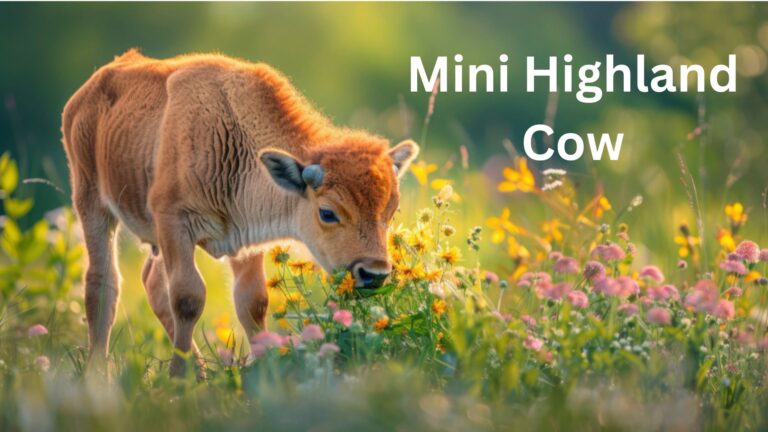Mini Highland cows, with their adorable appearance and friendly nature, have become increasingly popular as pets and farm animals. These small versions of the traditional Highland breed offer all the charm and character of their larger counterparts but in a more manageable size. This article provides a comprehensive guide to mini Highland cow, covering their history, characteristics, care, and more.
Introduction to Mini Highland Cows
Mini Highland cows are a scaled-down version of the traditional Highland cattle, originally from Scotland. Known for their distinctive long horns and shaggy coats, these miniature versions retain the same charm and personality but are better suited for smaller spaces and less intensive care.
History and Origin
The Highland breed, known for its ruggedness and adaptability, has a long history dating back to ancient Scotland. The original Highland cows were bred to withstand harsh weather conditions and tough grazing environments. The miniaturized version was developed through selective breeding to create a smaller, more manageable breed that still embodies the Highland’s distinctive features.
Physical Characteristics
Size and Appearance
Mini Highland cows are notably smaller than their full-sized counterparts. Typically, they stand between 36 to 42 inches tall at the shoulder and weigh around 600 to 800 pounds. Despite their smaller size, they retain the Highland breed’s characteristic long, curved horns and robust build.
Coat and Color
The mini Highland cow’s coat is one of its most striking features. They have a long, wavy, and often shaggy coat that can come in various colors, including black, red, and brindle. This coat not only adds to their adorable appearance but also provides insulation against the elements.
Temperament and Behavior
Mini Highland cows are known for their gentle and friendly nature. They are generally easy to handle and are often described as affectionate and curious. Their calm demeanor makes them excellent companions, and they can even be trained to perform basic tasks or participate in petting zoos.
ALSO READ:The Mini Bernedoodle: A Comprehensive Guide
Care and Maintenance
Diet and Nutrition
Maintaining a balanced diet is crucial for the health of mini Highland cows. They primarily graze on grass but may also require supplementary feed, especially during the winter months. High-quality hay and specially formulated cattle feed can help meet their nutritional needs. Regular access to fresh water is also essential.
Housing and Space
While mini Highland cows require less space than their larger counterparts, they still need ample room to roam and graze. A well-fenced pasture with a shelter to protect them from harsh weather conditions is ideal. The shelter should be draft-free and provide adequate space for them to move comfortably.
Health and Grooming
Regular health checks and vaccinations are important to keep mini Highland cows healthy. They are generally hardy animals, but they can be prone to certain health issues, such as hoof problems or respiratory infections. Regular grooming is also necessary to maintain their coat and prevent matting.
Benefits of Owning a Mini Highland Cow
Owning a mini Highland cow comes with several benefits. Their smaller size makes them more manageable and suitable for hobby farms or even larger backyards. They are also less demanding in terms of food and space compared to traditional cattle. Their friendly nature and unique appearance can provide companionship and joy to their owners.
Challenges and Considerations
While mini Highland cows are relatively low-maintenance, they do require a commitment to their care. Potential owners should be prepared for the costs associated with their feed, shelter, and healthcare. Additionally, ensuring they have enough space and proper fencing is essential to prevent any issues.
Conclusion
Mini Highland cows offer a charming and manageable alternative to traditional cattle breeds. With their distinctive appearance and gentle nature, they make excellent pets and additions to hobby farms. Proper care, including a balanced diet, suitable housing, and regular health checks, is key to ensuring their well-being.
FAQs
What is the difference between a mini Highland cow and a full-sized Highland cow?
Mini Highland cows are a smaller version of the full-sized Highland breed. They typically stand 36 to 42 inches tall and weigh between 600 to 800 pounds, compared to their larger counterparts who can be much taller and heavier.
How much space do mini Highland cows need?
Mini Highland cows require less space than full-sized cattle but still need ample room to roam and graze. A well-fenced pasture with a shelter for protection is ideal.
What do mini Highland cows eat?
They primarily graze on grass and require supplementary feed, especially during winter. High-quality hay and specially formulated cattle feed, along with fresh water, are essential for their diet.
Are mini Highland cows good with children?
Yes, mini Highland cows are known for their gentle and friendly nature, making them suitable for families with children. They can be affectionate and enjoy human interaction.
What are the common health issues for mini Highland cows?
Common health issues include hoof problems and respiratory infections. Regular health checks, proper grooming, and a balanced diet can help prevent these issues.

